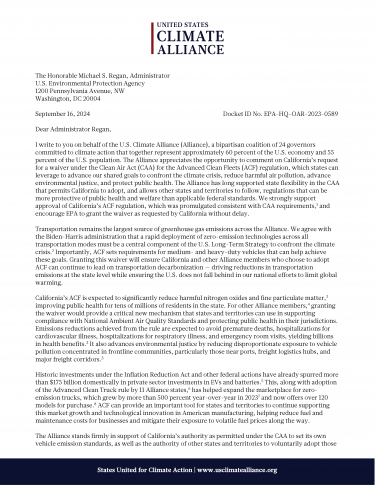Home / U.S. Climate Alliance Requests EPA Approval of California’s Advanced Clean Fleets Waiver
- Letter
U.S. Climate Alliance Requests EPA Approval of California’s Advanced Clean Fleets Waiver
September 16, 2024
The Alliance has long supported state flexibility in the Clean Air Act (CAA) that permits California to adopt, and allows other states and territories to follow, regulations that can be more protective of public health and welfare than applicable federal standards. In comments to EPA, the Alliance encouraged timely approval of California’s waiver request for the Advanced Clean Fleets (ACF) regulation. Granting this waiver will ensure California and other Alliance members who choose to adopt ACF can continue to lead on transportation decarbonization — driving reductions in transportation emissions at the state level while ensuring the U.S. does not fall behind in our national efforts to limit global warming.
The Alliance stands firmly with California and its authority under the CAA to set its own vehicle emission standards, as well as the other states and territories that choose to voluntarily adopt those standards.
Read the Alliance’s full letter here.
About the Alliance
Launched in 2017 by the governors of Washington, New York, and California to help fill the void left by the U.S. federal government’s withdrawal from the Paris Agreement, the Alliance has grown to include 24 governors from across the U.S. representing approximately 60 percent of the U.S. economy and 55 percent of the U.S. population. Governors in the Alliance have pledged to collectively reduce net greenhouse gas emissions by at least 26-28 percent by 2025, 50-52 percent by 2030, and 61-66 percent by 2035, all below 2005 levels, and collectively achieve overall net-zero greenhouse gas emissions as soon as practicable, and no later than 2050.
The Alliance’s states and territories continue to advance innovative and impactful climate solutions to grow the economy, create jobs, and protect public health, and have a long record of action and results. In fact, the latest data shows that as of 2023, the Alliance has reduced its collective net greenhouse gas emissions by 24 percent below 2005 levels, while increasing collective GDP by 34 percent, and is on track to meet its near-term climate goal of reducing collective greenhouse gas emissions 26 percent below 2005 levels by 2025.
###
